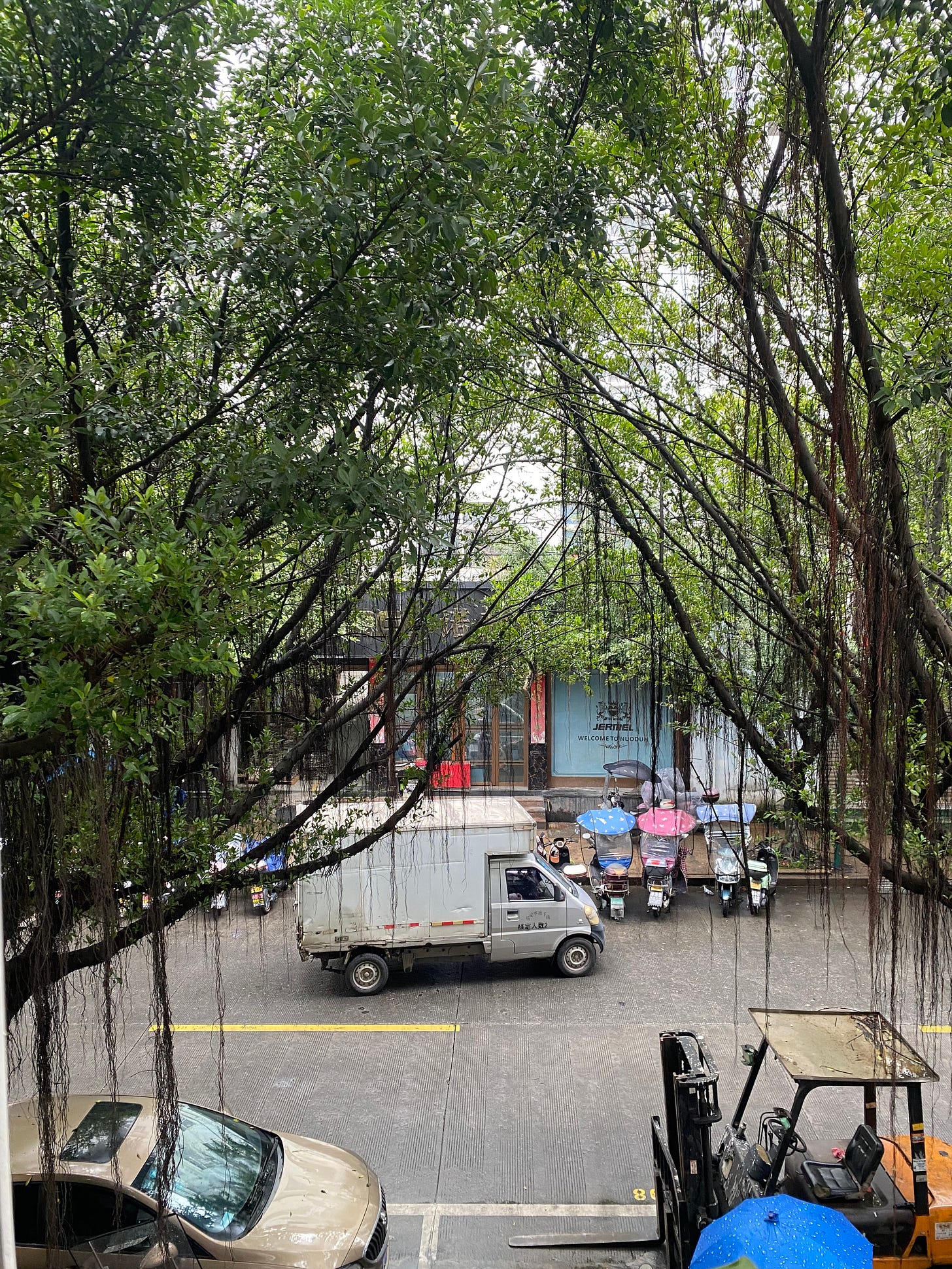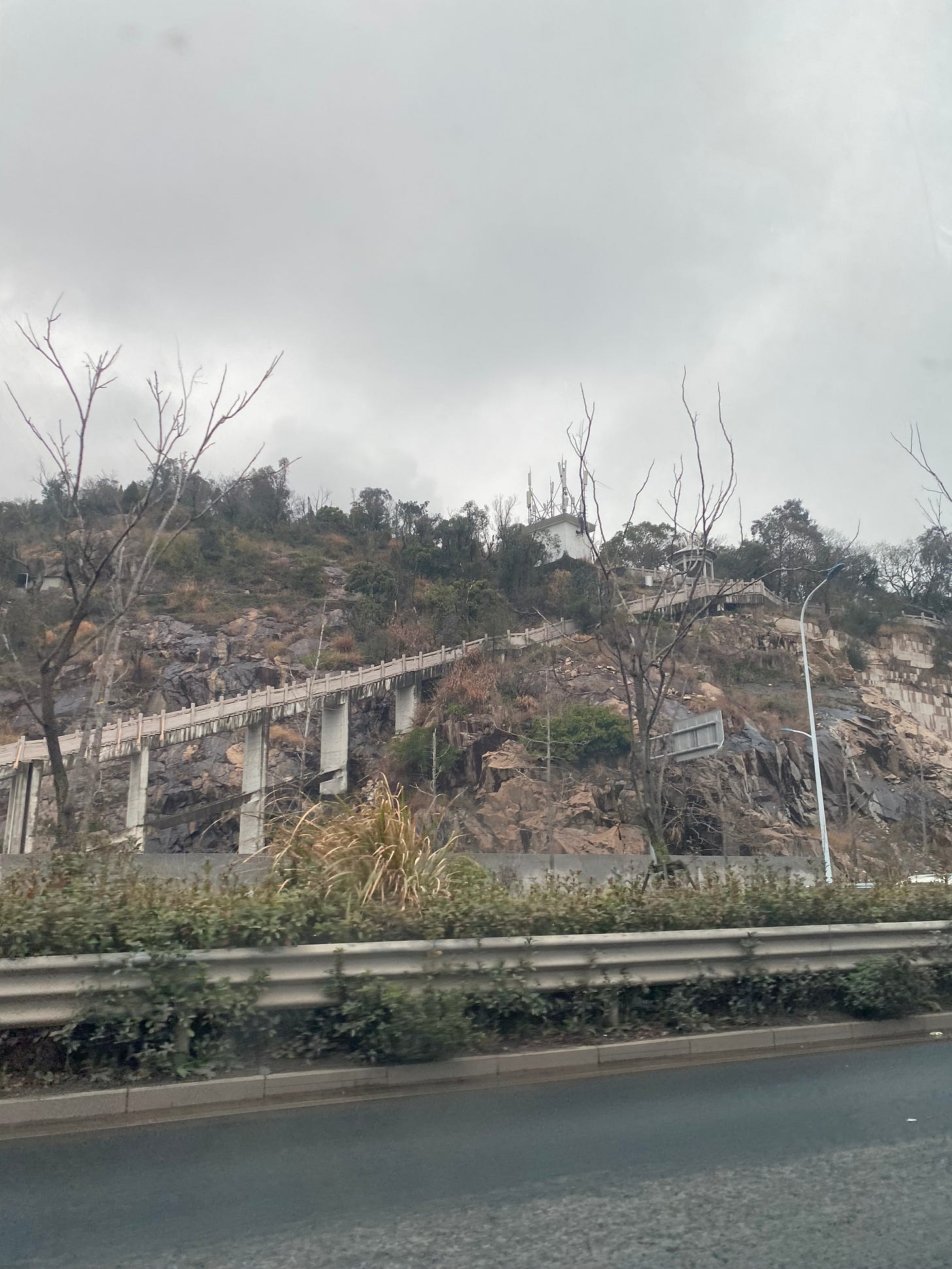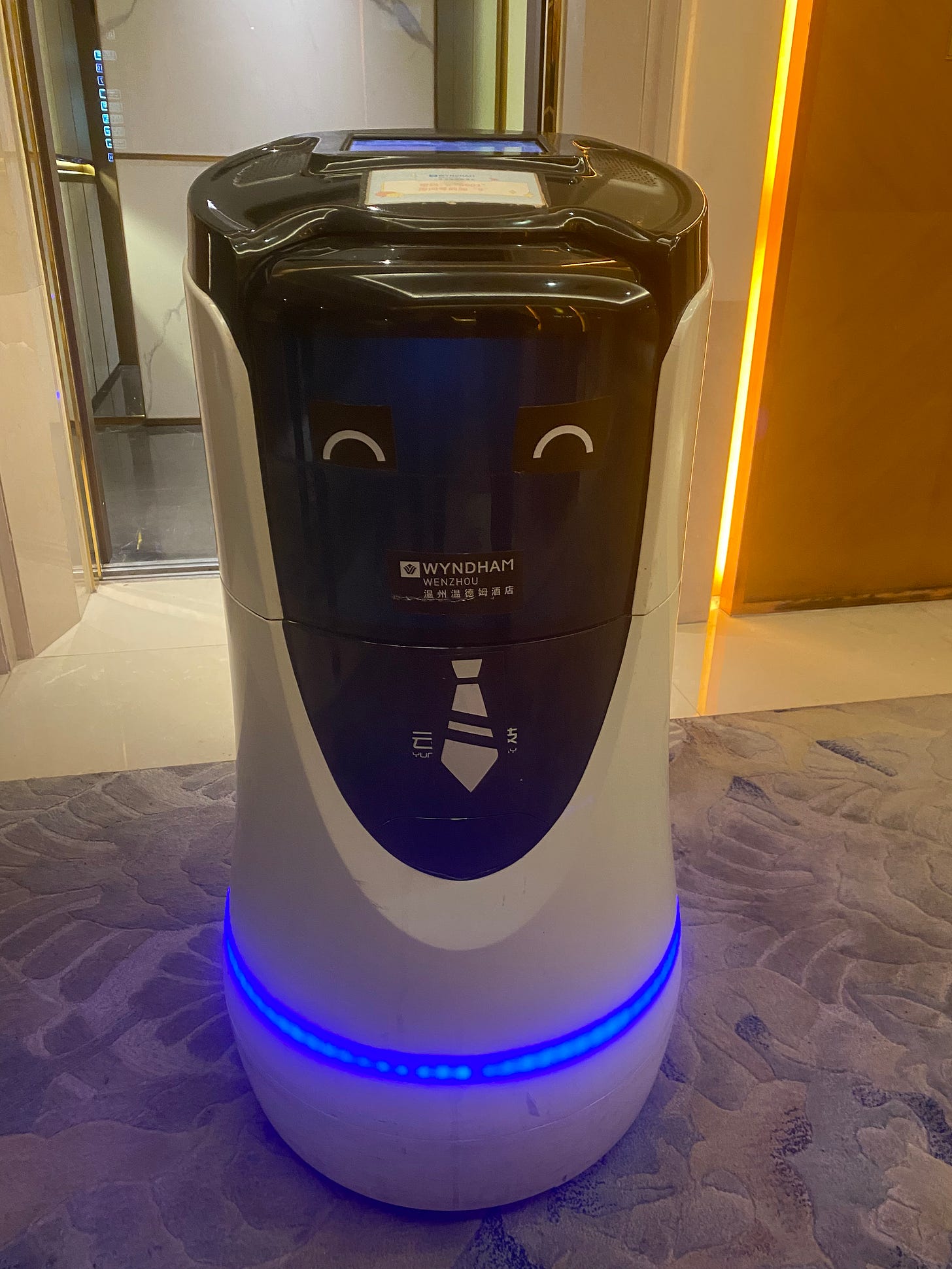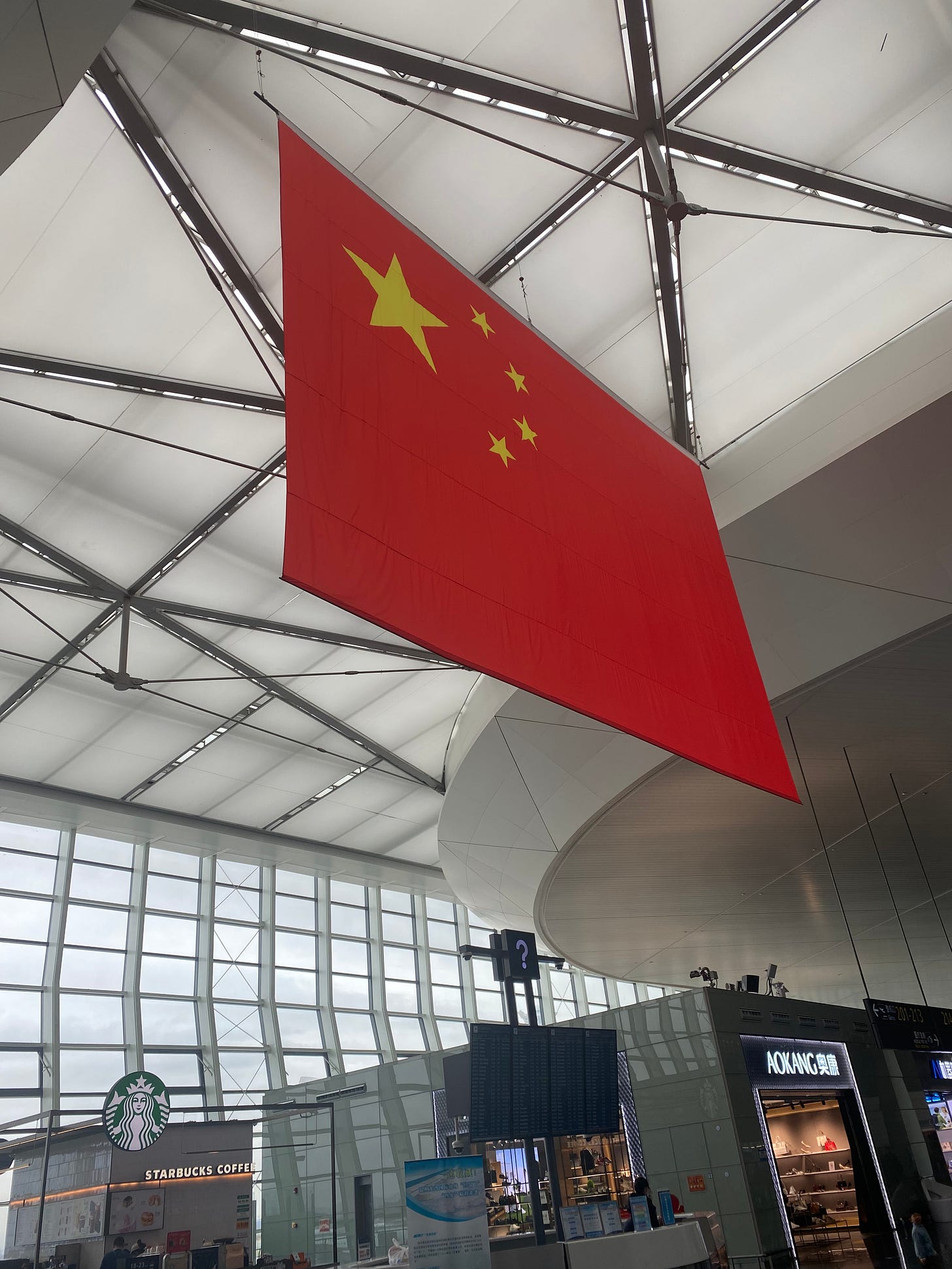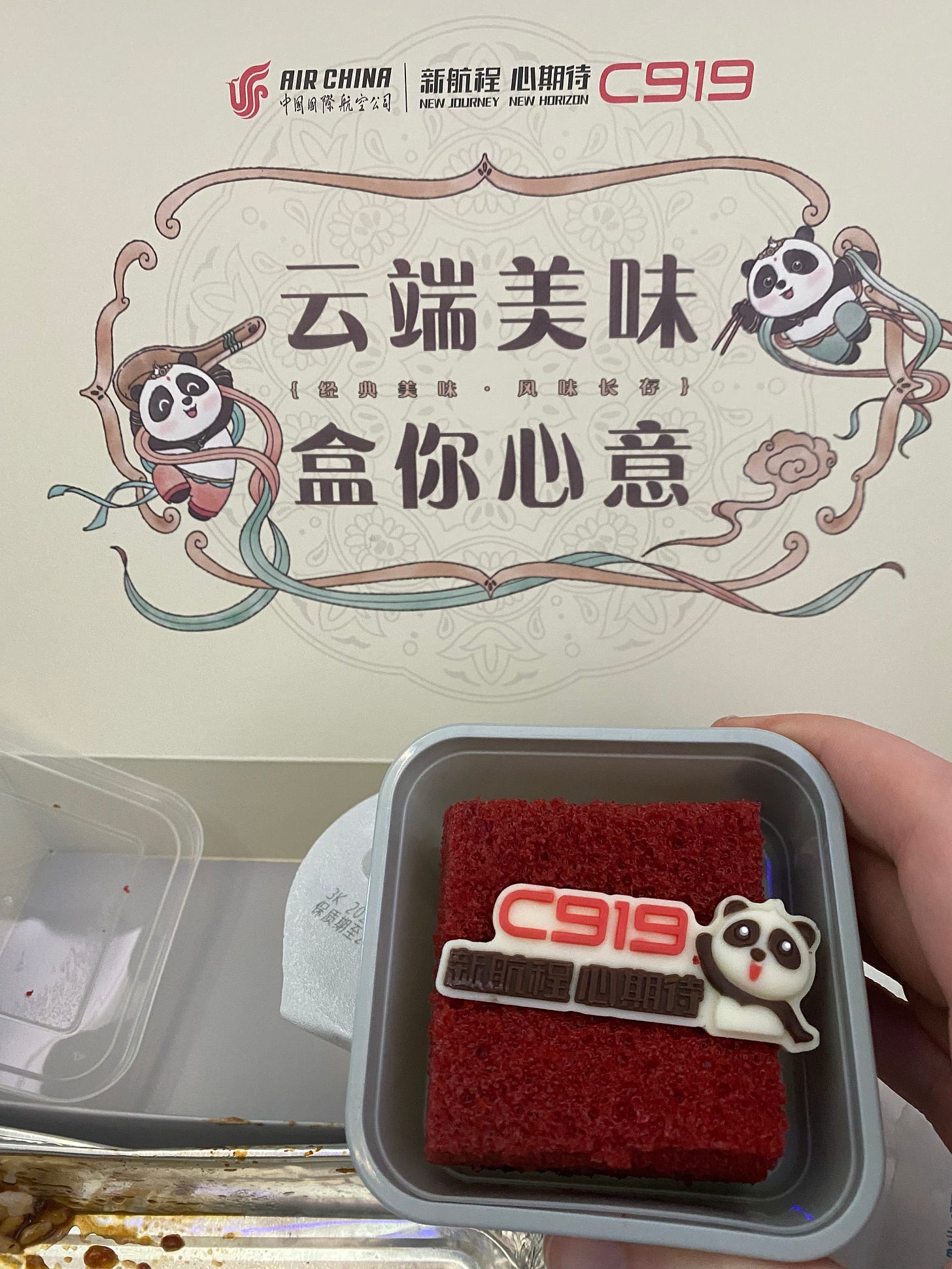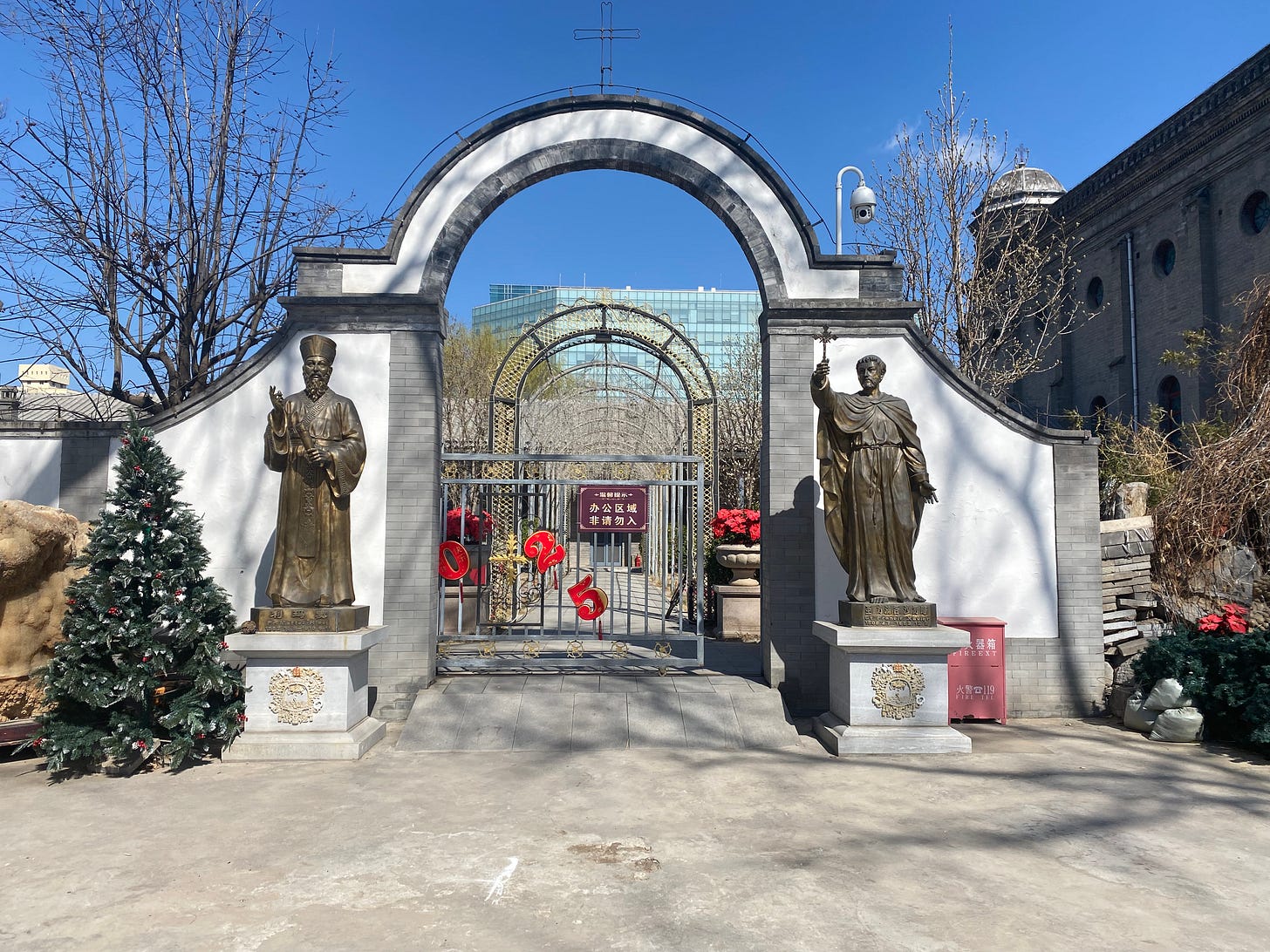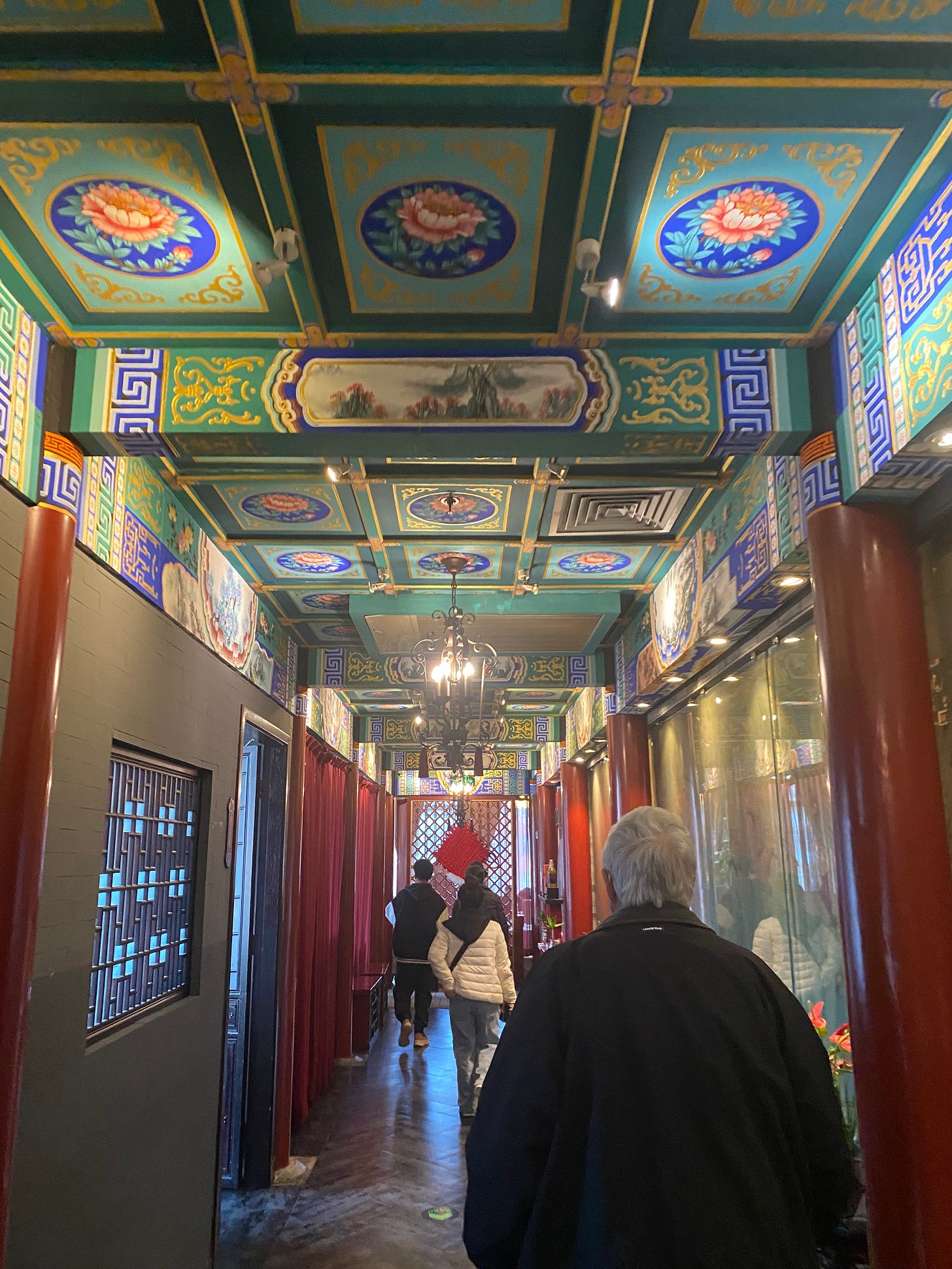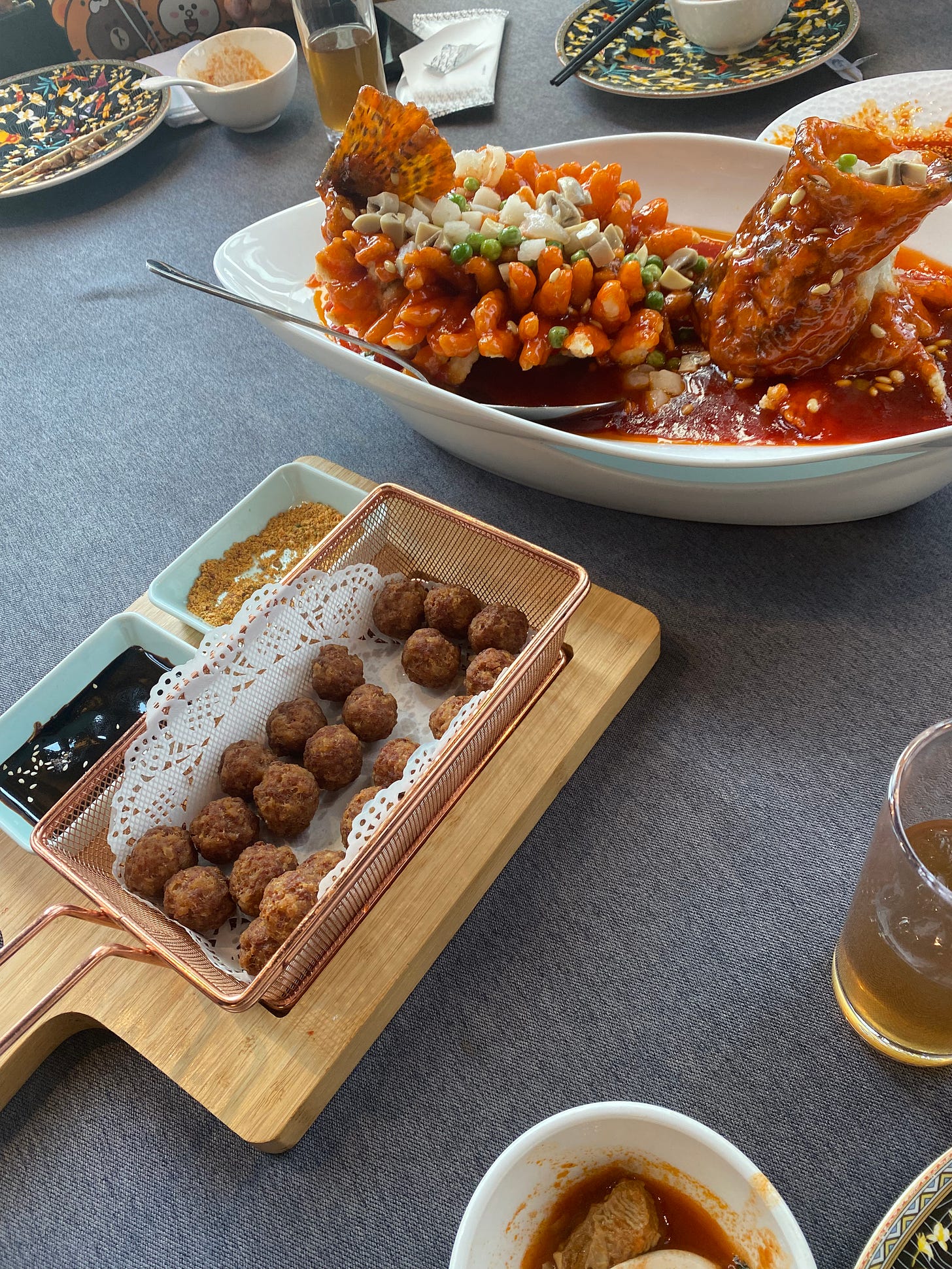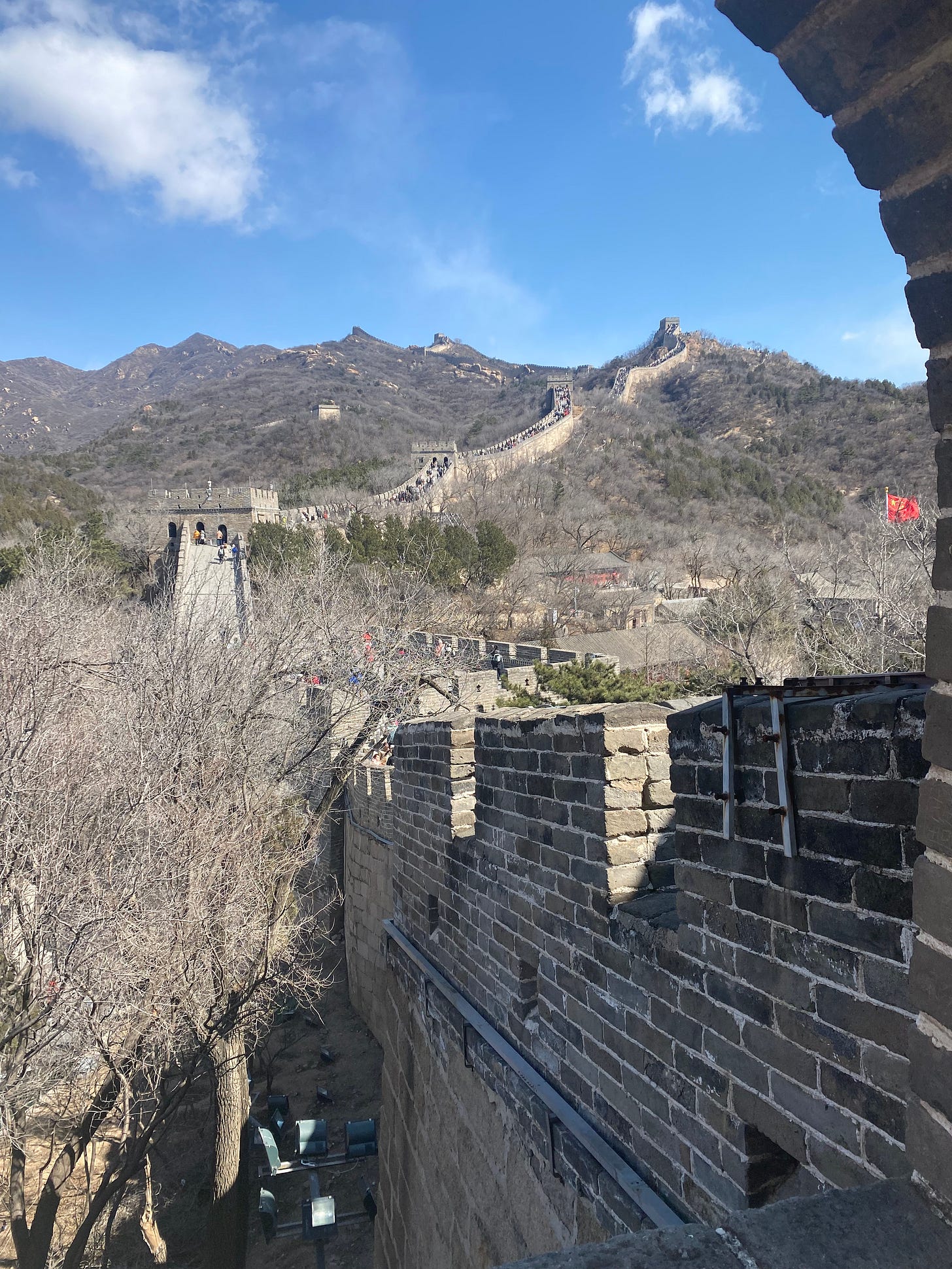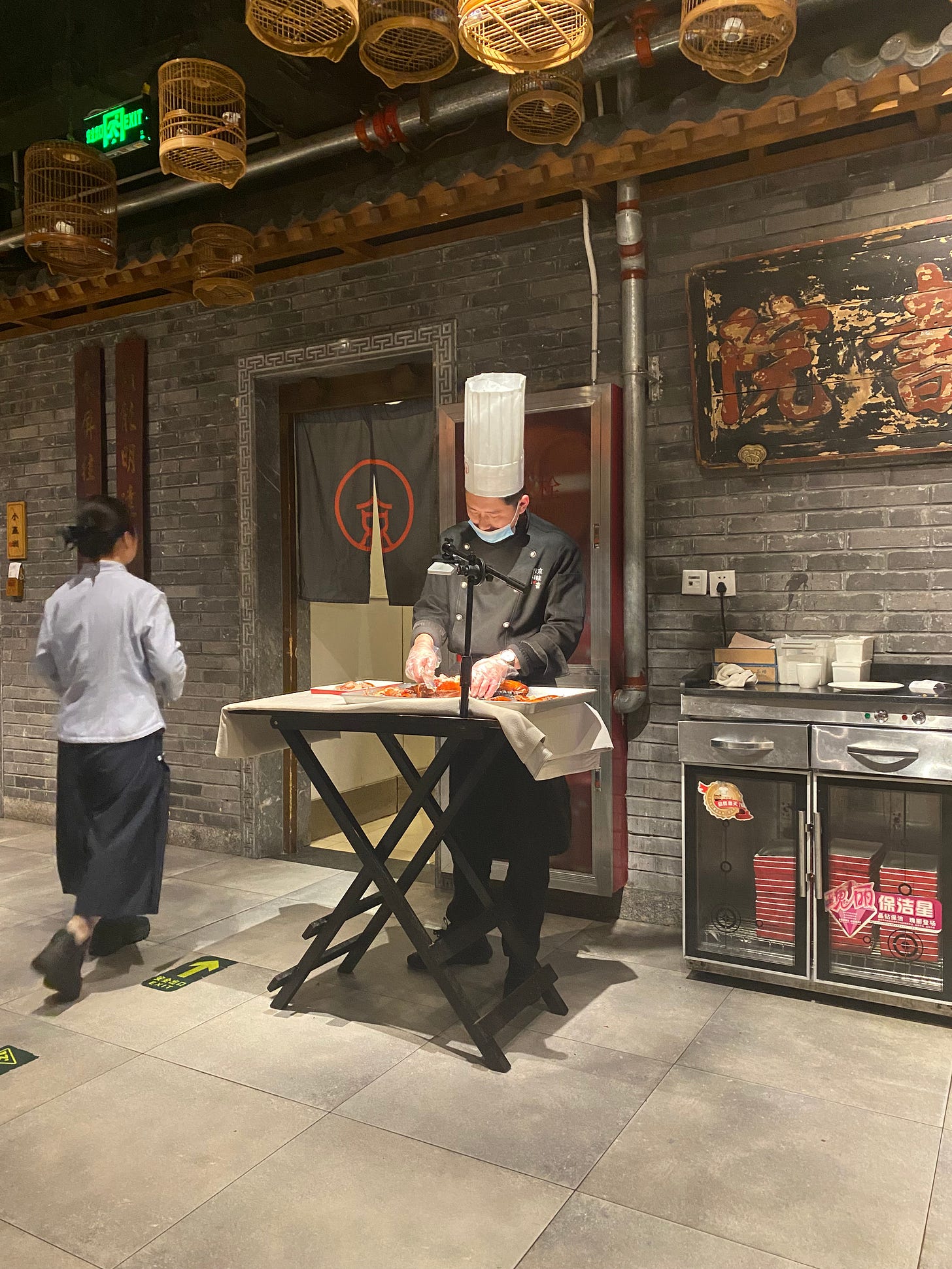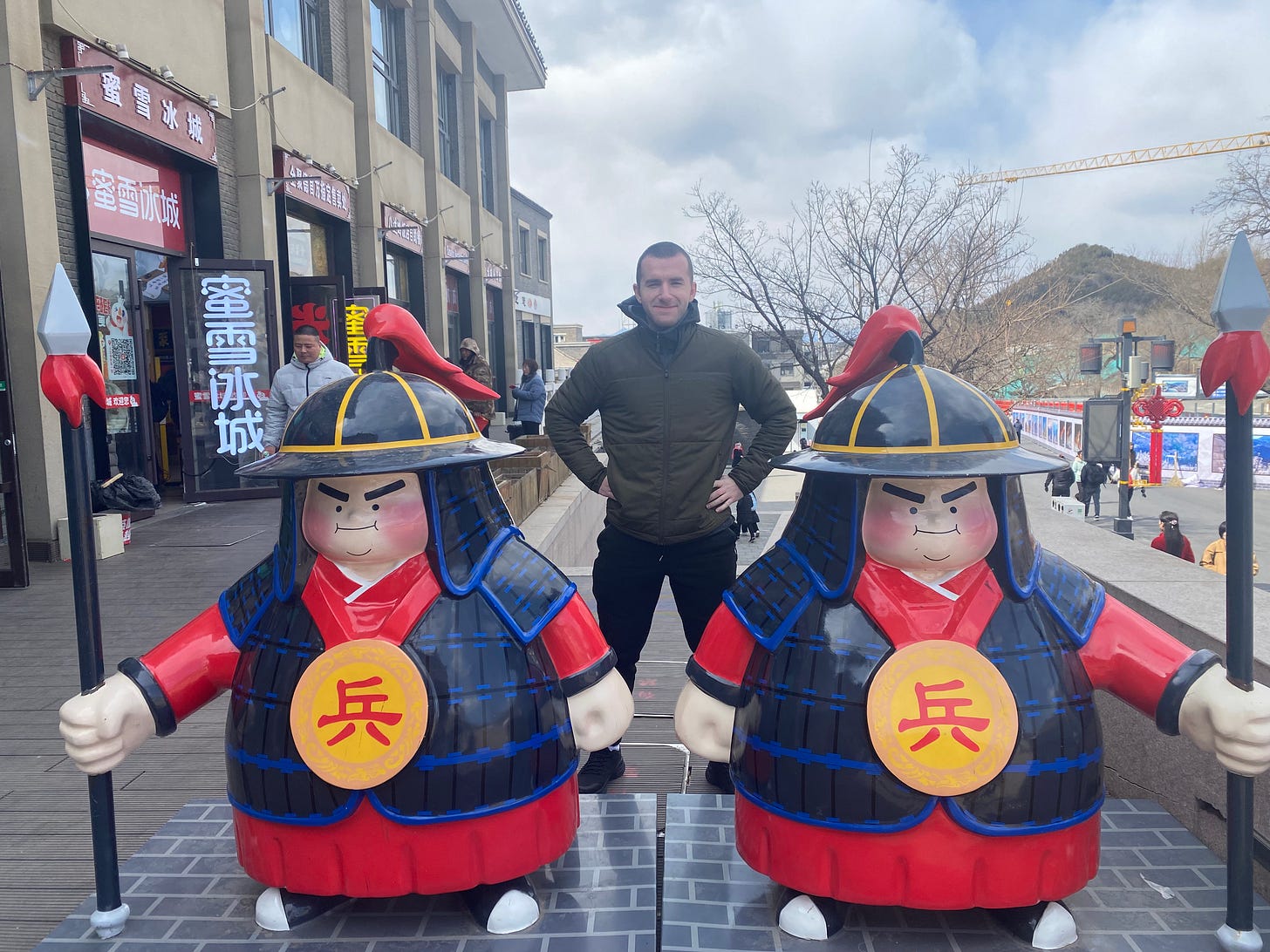China Journal (3/3)
See China through my written experiences. Wonder what a Catholic Mass in China looks like, come on over and read about it! Days 15-19 of 19 - Wenzhou and Beijing.
Day 15
Our first full day in Wenzhou would see us on a busy schedule. Our agenda was to visit two suppliers today. While their operation was a bit more traditional than that of the advanced supplier from yesterday, there was still a lot to look forward to.
We were picked up at 9:30 by a younger-looking man driving a NIO. I had not been in one yet this trip, so I was excited for the ride. The interior was beautiful, and the technology in the car was pretty sharp. Our driver spoke a bit of English, allowing for some exchange of banter.
When we pulled into the facility, old friends waited for my work colleague and took us outside. There was definitely a warm family feel to this company. Soon into the conversation, we discovered our driver was the boss’ son, who was only 30 years old. I must say, it was nice to see a younger guy so involved in the operation. For most of this trip, I have been the youngest man in the room by some distance. That’s not a bad thing, as there is plenty to learn, but it’s also reassuring to see young people involved as that means they'll still be around 10-20 years from now.
The boss’ son and I established a connection when I mentioned I played Romance of the Three Kingdoms. He laughed and said he poured many hours into that game as a kid. After some more casual conversation, we were shown around their plant. It was smaller, but their capacity was still very impressive. The location of the plant was also super picturesque. Moss draped down from the trees around the compound, casting shadows on the road and sidewalk alike.
After the tour, we exchanged more conversation and were told to wait until we were to go to lunch. While we were waiting, the grandfather of the boss visited. He was not involved in this business. Instead, he operated a leather business. I found this interesting and almost wish we could’ve seen his operation. Then again, the leather industry is a bit morally suspect, to say the least, even in the US. I’m sure that in China, it’s even more dramatic.
This brings me to a segue point. It’s quite hypocritical in many ways, too, and I’m well aware of that. I own leather products myself and would like to see how they are made, but I probably don’t have the gall to see it. Similarly, especially in the south of China, you can peruse fish tanks where lobsters, crabs, prawns, shrimps, fish, etc., await their inevitable doom at the hands of the chef just behind the counter. Our hosts loved analyzing the creatures and picked the one they thought looked best. I am not criticizing the Chinese approach here, but we Americans felt slightly unsettled by this. My girlfriend, work colleague and I somberly looked at the fish and crabs. Some seemed to accept their fate and waited for the inevitable, while others tried to escape. While, in general, we feel less attachment to sea creatures, this is a little disturbing. I wouldn’t go as far as to say that it ruined my mood, but it shakes you a little. Then again, we move on quickly and even eat what we saw minutes later. Hypocritical, yes, but something I still deem worth sharing.
Before we headed off to lunch, our supplier gave each of us a very kind gift. It was a gold replica of a Chinese banknote. It was extremely thin, like an actual banknote, and probably was mostly gold, if not entirely. This gesture was extremely kind, and we really appreciated it.
Our lunch with these suppliers went exactly the same way as above. During this meal, I concluded that I don’t really enjoy seafood. I like some fish, but shellfish is not my favorite, at least in terms of how it was prepared in China. Call me lazy, but I don’t like to break the shell of a crab or extract fishbones to eat. That said, Melanie, who grew up eating crabs this way in her native Ecuador, very much enjoyed it.
After lunch, we drove off to go back to the hotel, but the boss’ son asked us if we wanted to see him swap the battery in his NIO. For context, detractors of electric vehicles regularly cite that replacing a battery is expensive, which makes the alternative energy automobile inconvenient. In NIO’s case, you can still charge the battery like normal EVs, but they supposedly set up battery swap stations around China.
First, the boss’ son gave us a little flex by engaging his NIO’s self-parking feature that reversed back into the battery swap station as he scrolled on his phone. Once on the platform, his vehicle is raised slightly, and the floor partition opens up to reveal a mechanic mold of sorts that will remove the battery. Once the battery is removed, it is swapped away, and then the new battery is taken and applied. The whole process took around 5 minutes.
I don’t know how much this would cost since our business partner bought his NIO model early and received the privilege of free battery swaps for the lifetime of his vehicle. Regardless, it’s amazing to see. I remember hearing Tesla was interested in doing this around the US. I have no idea what the status of that is.
After the show, we returned to the hotel, where we could rest for about an hour before visiting the next supplier. This supplier was in the business of making one specific item. Of course, this one item can have different designs and sizes. Overall, each part is approached similarly and follows a parallel process.
Their facilities were certainly a step down from the previous two regarding safety and aesthetics. That said, it’s clear that he does a bang-up job. I mean no offense when describing the facility this way, but I cannot help but compare it to the other plants we’ve seen on this trip.
After the brief tour, we met in the owner’s office, where he prepared tea for us. He was a very jovial man who loved to laugh frequently. These are my sort of people. We had a great conversation about everything: business, current events, and life in general.
During our conversation, however, I heard the name Deng Xiaoping mentioned in what seemed like a long-winded complaint. Since I am very interested in Chinese history and politics, I asked Yan what our supplier said. I was told that he was not a significant fan of the current government leadership and preferred the leadership of Hu Jintao, Jiang Zemin, and, most of all, Deng Xiaoping. When he expressed his opinion, he did not lower his voice nor look over his shoulder as some might expect. That said, our Chinese colleague seemed a little uncomfortable with the comment. She couldn’t understand why he didn’t like President Xi but would not press further and ask why. This moment was brief, but I wondered if I would hear opinions like this during my trip here.
For the most part, most Chinese are very patriotic and express a deep pride for their nation. They believe their government is a net good for their lives and society at large. Despite the significant technological leaps China has made under the guidance of the CCP, many Chinese still humbly refer to their nation as a developing country. While this might seem ludicrous to anyone who sees self-parking cars and a high-speed train, the Chinese explain that the countryside and rural areas still have a long way to go before modernizing. Earlier in the trip, I was told that one plant’s manufacturing processes would not be permitted in a major city for health and safety reasons. In their view, once plants like that and this one today are held to the same standards as those in Shanghai, Shenzhen, Beijing, etc., they are truly on the way to modernize and further develop. It was interesting to hear it defined in this way. When you hear modernization and development, you would think of technological enhancements. Still, in China, this also refers to developing health and safety practices to make things safer for the workers.
We kept dinner lowkey and stayed at the hotel for their buffet. There was a good conversation that was very relaxing. A nice touch before traveling once again. We went back to where the trip had started in Beijing.
Day 16
After breakfast, we took the hotel’s shuttle service to the airport. I was excited to go to this airport as there was practically no one when we arrived. While departures seemed a little bit busier, it was a far cry from what we had already seen on this trip, which, in comparison, is still an easier time than Newark.
I wore my PLA hat today and certainly received a lot of looks. They weren’t hostile but more humorous, I suppose. I noticed they whispered a bit and then looked over their shoulder with a smile. Some laughed. I didn’t mind the attention, but it was something to consider. You get enough glances for being a foreigner enough. Wearing any Chinese paraphernalia only multiplies that. I asked Yan if this was offensive before wearing it, and she replied that it was not. If anything, it would get some looks of admiration, or onlookers would say it was cool.
While we were going through security, we noticed a checkpoint that was incredibly pink. It was then pointed out that that is a women’s only checkpoint. My girlfriend and I found that pretty cool. Only women were allowed and only women security officers worked at that stop.
We were early, so we waited for about an hour to board. I think there was only a minute during that time when there wasn’t an airport announcement. I give them credit, though. They have to do it in both Chinese and English.
Today's aircraft was a Chinese-manufactured plane, the C909, by Comac. For the entirety of the trip, every flight was in a Boeing plane, so it was nice to see a switch-up. The plane was small, only having 70-90 seats, apparently. The seats were comfy, however. This flight was not a good one, though. I don't blame that on the plane, however. There was a lot of turbulence, and the ride was bumpy overall. The landing was smooth, at least.
After some confusion in the airport, we found our driver, who was supposed to pick us up. We walked over to the airport’s garage and found he had the most beautiful van. Reclining seats, a nice clock display in the back, and even curtains if you wanted to get some rest. As we departed, we found it was snowing in Beijing. We were only in Shenzhen at the beginning of this week, so this was a bit jarring. However, it was still lovely to experience snow in China’s capital.
One thing I certainly did not miss about Beijing was the traffic. I’m telling you, this city could have bumper-to-bumper traffic at about 1 AM, I’m sure of it. There was not a time in this city where there wasn’t traffic. Regardless, the reclining seats certainly made things better.
We returned to our familiar setting of the first hotel we stayed at in China. It was one of the best, so it was good to return here. It also had the best breakfast with the most variety. We dropped our stuff off at our room and took a cab to a restaurant Yan and a work colleague had visited. It was a lowkey Cantonese restaurant.
After dinner, we walked around to find some last-minute gifts and another suitcase to carry all the gifts we had bought. For one, Beijing seemed even colder than when we first arrived. That being said, I have to comment on the style of the Beijingers. They really do dress well, both men and women alike. Of course, there are people dressed ordinarily, but many have long coats and nice shoes. Some accessorize their look with fashionable glasses and hats. The colors they choose are muted for the most part. Blacks, whites, and greys are the most common colors you see. In our time here, it was rare to see someone stick out with a unique colored coat, though they exist.
We poked around at an underground mall for a while but found it was just retail shops. It was nothing of note for us, and we didn’t spend too long there. Instead of continuing to search in vain, we found a Holiland store. Holiland is a bakery chain in China. We’ve seen it in just about every major city we’ve been to. Their branding is very minimalist yet colorful. When you step in, you enter a soft pink paint dot. We saw the place often, but this was the first time we would try it on the trip.
This location was incredibly busy, but we could still get what we wanted. We got an Oreo cakester-ice cream sandwich box, a bao bun with red bean paste, and a Harry Potter-themed cake. The employees here were dressed exceptionally well and certainly added to the cute atmosphere of the place.
Once we were done there, we had done everything we could for tonight. It was time to call it a day. We took a cab home and returned to the hotel to retire.
Day 17
It was Sunday in Beijing, and we were already set to have a busy day. We didn’t have time on the first Sunday in China, nor the second, to attend mass here, so I made it a point to ensure we went on our third and final Sunday. It is Lent, after all. We took a Didi to the church after breakfast at the hotel buffet. It was around a 30-minute drive.
This church is very special to me as its history is incredible. We were attending the Cathedral of the Immaculate Conception, or Xuanwumen church as it is known colloquially. This parish has existed since 1605, so it is rich in history. While the foundation built in 1605 is no longer, it is still tied to what was built during that time.
While there are other Catholic Churches in Beijing, I gravitated towards this one as the Venerable Matteo Ricci was its founder. In something that might seem strange, I don’t really look up to anyone, historical figures, or those currently living. However, Matteo Ricci is the exception. Matteo Ricci was born in 1552 in the Papal States. He entered the young Society of Jesus (Jesuits) at the Roman College, where he studied philosophy, theology, mathematics, cosmology, and astronomy. Ricci applied to participate in the eastern evangelization missions in the late 1570s. He sailed all the way to Macau after some time in Goa, a Portuguese colony in India.
In 1582, he studied the Chinese language and customs, making him one of the first Western scholars to master Chinese script and Classical Chinese. He would spend the rest of his life in China and worked his way up to Beijing, hoping to spread Catholicism in the Imperial Court. In fact, he was the first Westerner to be invited into the Forbidden City based on his scientific abilities and knowledge of using astronomy to predict weather events. While he never met the Wanli Emperor, he was able to rub shoulders with all the Ming scholars of the time and increased the Christian standing in China. He was tasked with working on Zhifang Waiji, the first global atlas of China.
After his contributions and overall helpfulness, important officials began to listen to his message and converted themselves. One of the most noteworthy was Xu Guangqi, who became one of the Three Pillars of Chinese Catholicism.
Ricci’s approach to evangelizing in China was very different from evangelization methods in the world. China’s government was already well matured, and its participants were well-read and offered intellectual skills in their respective areas. It wouldn’t do to approach this lightly. Instead of reinforcing the Catholic belief system, he needed to debate instead. While I won’t discuss this in too much detail, I will say this: Ricci compared the Catholic faith to existing Chinese concepts (Confucianism mainly) and preached that China already believed in Christianity but had different names for things. Instead of forcibly changing aspects of Chinese culture, he practiced what would later be known as inculturation: Adapting Christian teachings and practices to cultures. Ricci was highly successful with this approach and facilitated an East-West cultural and knowledge exchange. He died in Beijing in 1610 at the age of 57.
I looked around as we sat down in the pews of the Cathedral. The Cathedral was quite packed. 99% of the parishioners were Chinese. The only other Westerners in the building sat right behind us.
Now, of course, I have heard that religious freedom in China is a rather complicated topic. More specifically, I have heard that Catholicism in China is a bit controversial. I don’t fully understand yet, so I won’t try to explain it, but what I do know is that there is a state influence on religion here in China. The Holy See has some disagreements with how involved the CCP truly is, though it seems that matters have improved in recent years. The Chinese Catholic Patriotic Association is the national organization that oversees Catholicism in China, and it appears they are pretty fond of Pope Francis (I am too) but the organization itself is not recognized by the Holy See. Some members of the CCPA argue that Pope Francis is an example of a good communist. While Pope Francis is certainly not a communist, I assure you, it goes to show how multifaceted the Catholic beliefs are. So, as much as this was a fulfillment of my Sunday obligation, this was also a visit for research purposes.
Mass began at 10 AM sharp and was conducted entirely in Mandarin. Online, it did say this mass was supposed to be in English, but from what I understand, many foreigners left or do not visit Beijing anymore since the pandemic. Obviously, it would be a waste to host an English mass if only 1 or 2 people would attend.
That’s the good thing about Catholicism, however. Catholic, meaning Universal, was first used in 110 A.D. by Saint Ignatius of Antioch. This church was designed to be universal and, as instructed by Jesus, was built off the foundation that Peter built as the first Pope. All Catholic masses worldwide follow the same sequence of events. Some regional and cultural differences can occur, but the structure of the mass is the same no matter where you go. So, even though neither Melanie nor I can speak or understand Mandarin, we did not have a problem following the mass.
First, I must give credit to the Immaculate Conception’s choir. They were stunning, and the Chinese language complemented the church hymns well. I would have bought a CD of their work if it was available. From early on in this mass, I could see that much of what I heard was misguided. This was no performance masquerading as a genuine service. This was an honest-to-goodness celebration with actual parishioners who earnestly believe in the Word of God. I held back some emotions when I saw it, but I can assure you my eyes were welled up.
The priest gave a very long homily. I would have liked to have understood what he was saying, but my Chinese is not up to the task. During this time, however, I stayed in quiet contemplation and looked around at the church’s architecture.
When it was time for the sign of peace, the Chinese did this differently. Instead of a quick wave or shaking hands, they make prayer hands and then bow to you. I quite liked this. While China does not have much of a bowing culture anymore, it is cool to see some echoes of the past as Chinese and Catholic traditions are mixed together.
The Chinese parishioners around us seemed to make it a point to make direct eye contact and did not rush their bow to us. It made us feel very welcome, and we tried to do the same for them.
When it was time for the Blessed Sacrament, I noticed no one stayed in their seats. Even people who did not plan on receiving the Eucharist went up to receive the blessing from the priest and Eucharistic minister, to which they are encouraged to do so. This isn't prevalent back in America, at least in my parish. People who do not intend to receive the Eucharist will often stay seated. I prefer the participation of Chinese parishioners here. I think it’s nice for people to come up and receive the blessing.
It was clear the Eucharistic Minister and Priests knew their stuff as well. The Westerners behind us went in front of us in line for communion, and when they both approached the front, they dropped to their knees, and the Body of Christ was placed on their tongues. There was zero hesitation from the Eucharistic Minister here, meaning he was very clearly educated properly.
The Blood of Christ was not administered to the parishioners during this mass. However, this is not out of the ordinary, as I still see some parishes not serving the wine due to the changes since the pandemic. My home parish started providing it again, but I typically do not take it.
The actual host was less wafery and seemed more like bread in the Cathedral of the Immaculate Conception. It was very thin and did have more of a wheaty taste.
After mass was concluded, this is where I saw the first major difference in their celebration. Once the priest ended the mass and disappeared into the back, a young woman who announced a plethora of things in the mass seemed to call for a unified prayer. The whole parish knelt down and started praying the Our Father. The only way I knew that was because the prayer started with wǒmen de tiānfù (我們的天父). I know wǒ men from my Chinese lessons. On its own, it means we, but with “de” being added, indicating possession, it becomes “Our.” Throughout the mass, I heard tiānfù often and concluded it was 'father' or perhaps more literally here, Heavenly Father. Again, I am no expert on the Chinese language, but just trying to piece together what I heard.
Once we left the church, I had to find the statue of Matteo Ricci that stands in one of the courtyards by the Church. After walking to the left, he stood alongside St. Francis Xavier in front of a gate. I placed my hand on his statue, said a quick prayer for him, and asked him to pray for me in fulfilling my mission (Helping Westerners understand more about China).
There was a stunning Marian grotto right next to the two statues. The water was steaming, which created a very ethereal atmosphere. I said a Haily Mary and snapped a few pics before moving along.
The church has a gift shop, which I absolutely had to check out. I bought plenty of merchandise, which hopefully will help fund their missions. Though no one spoke English, they appreciated my caveman Chinese, where I said one or two words to hopefully convey my point. They were very friendly and welcoming.
After that, we returned to the hotel and met up with our colleagues to get lunch. We were introduced to Beijing style noodles. You get a bunch of vegetables and a pork sauce and then mix them to create an incredibly delectable combination.
Once we were done there, we prepared to go to Silk Street, a mall where pretty much any price is negotiable. I was looking for two things, an extra suitcase and a souvenir store to bring home some Chinese trinkets for my friends. This store had everything I could ever want, and I put together 2 baskets worth of merchandise. I was concerned about the guy throwing a price at me when I went to check out. It was $760 for all the stuff I got, which was absurd. I did the conversion calculation to USD from RMB, and he could see my eyebrows raise. He offered a lower price one by one. By the end, he gave me everything for around $650. While I still feel like I got scammed, he at least gave me a couple other items on top of what I already got.
After we were done, I asked the man if he knew where to get a suitcase. He immediately grabbed one of my bags and said follow me. I didn’t appreciate that, but I suppose it was his way of showing hospitality. Needless to say, I can carry my own things. We were brought to an upstairs luggage store, where a girl awaited us. She was very kind and spoke great English. She said that the man who helped me at the souvenir store was her brother. At first, I believed her, but later, I realized everyone was a brother and sister at the mall. Very believable (sarcasm).
We weren’t looking for a really big suitcase. Medium size would do. She got some suitcases made of aluminum and steel, but they were over $250, and I was not about to spend that. She did an amusing show where she tried to break the suitcase to show it was good quality. It made us laugh, but it wasn’t what I was looking for. I asked if she had a cloth suitcase, and she took us around back to show us. I said my maximum limit to spend was 1000 RMB, and she said she could give us the suitcase for that much but insisted on giving us a better quality one for 1400 RMB. She said, “My brother will be mad if I don’t give you good quality.” And instead of arguing, I said, “I just need something simple, and I don’t want you to give away a nice suitcase for the price I want to pay.” She looked at my girlfriend and said I was a very thoughtful man.
I’m not the arguing type and not really good at this negotiation, but I noticed I could reframe the argument to get her to back off a bit. It all worked out, though, and I got a fairly nice cloth suitcase for 1000 RMB. Now, let’s see if it survives the two flights home.
I was satisfied and ready to return to the hotel, but a woman pulled us away at a replica bag store across the way. I read about this in particular. This mall is known for selling replica bags of high-luxury brands. Obviously, I know nothing about this, but Melanie was mildly interested. We were taken behind a curtain and shown a bunch of different bags. It was here that I noticed I was a better negotiator for others than for myself. My feedback to the seller probably bordered on annoying, but after a few back and forths with her, I showed Melanie what she should spend in RMB, and we managed to get just above that price. Melanie said this was an insane deal, and she was happy, so all went well.
After we checked out, we booked it out of there, not wanting to be handed to another vendor.
Despite getting what we needed, I was unhappy with this experience. This place is a tourist trap through and through. The way they operate also made me a bit uncomfortable and made me question some legalities. We are guests in another country, and I do not want to feel like I am breaking some rules. Yan later told me what occurs there is perfectly legal, but my gut feeling was still the opposite. Overall, if you’re a good negotiator and comfortable with going back and forth with the vendors, this is probably a decent place. Just be ready is all I’ll say because they are very pushy.
We returned to the hotel and did feel some peace of mind. All the gifts we needed were acquired. “No more opening our virtual wallets for the rest of this trip,” I said.
Dinner was lowkey tonight. We stayed at the hotel and enjoyed the buffet they offered. During dinner, Yan said, “Now that you have seen the church, you can go back and tell America that China has religious freedom.” Needless to say, I am reasonably inclined to agree. I would obviously need to do more research and get to know more Catholics in China, but on a surface level, they seem like completely normal people who are pious believers. Are there some questionable acts that happen behind closed doors? I’d be inclined to say yes to that, too. Before I went to church today, I was a little scared based on what I had heard, but my experience dispelled those feelings. At least in terms of Catholicism, there is freedom to practice.
There is then the matter of the underground church, but it seems that there is really no reason to not join the Chinese Catholic Patriotic Association. From what I understand, the underground church maintains loyalty to the Vatican, whereas the “open church,” as it’s called (and what I attended), recognizes the authority of both the state and the Vatican. Based on what I have read, this matter has improved considerably, and the Vatican now has the authority to approve or veto the appointment of bishops set forth by the CCPA. I’d like to explore this more in the future, so make sure you subscribe to stay updated. If I do write it, it will be published here on Substack.
The rest of the night was peaceful as we went into our last full day of the trip.
Day 18
As mentioned yesterday, today was our last full day in the country, and we intended to go out with a bang. Today, we will be visiting the Great Wall of China. We did not have time to visit the wall the first time in Beijing, so we ensured we got there before we left. After a late breakfast, we set out with our driver about an hour and ten minutes north of Beijing to Badaling, the most famous portion of the Great Wall.
Despite its popularity, I wasn’t super excited about this trip. I think that had more to do with some melancholy feelings that this was our last full day. However, as we approached, my excitement grew. I became fixated on the mountains that we started to see. I realized in that moment that I’ve never really seen mountains up close. Eventually, the Great Wall came into view, and my lack of excitement made a 180-degree turnaround.
We were dropped off at the entrance, but things would get confusing from here on out. There was no Great Wall to be seen where we were dropped off. It was just a parking lot with a museum in front of it. We saw many people queuing up for a shuttle bus, and I correctly assumed that was the right way to go.
After a 5-minute ride, now we were much closer to the wall, but it was still unclear where to go. There was a line for cable cars, but Melanie and I weren’t interested. Then again, we weren’t sure where to go, and it wasn’t easy to see who worked there. We stood around in confusion before backtracking to see if we missed anything. Turns out, we did. There was a sign for those who wanted to walk to the Great Wall, which is what we wanted.
We came to a nice, cute little touristy setup around the Great Wall. It mainly contained shops and some food places but was quite picturesque. Once we saw a security checkpoint, we knew we were in the right place.
One aspect that I didn’t like about China was how they queue for lines. This security checkpoint was really a free-for-all. People would shoulder you out of the way or cut in front of you without regard for who is behind them. One middle aged guy was practically on top of Melanie while she was waiting to put her cross-body bag on the security conveyer belt. That made her quite uncomfortable. It certainly doesn’t help that she’s small and surrounded by people who are all taller than her. Nevertheless, we got through it. I didn’t like this aspect of my trip, but I understand why this is normal. When you live in a country of 1.4 billion, if you’re not willing to seize your place in line, you might just stand where you are for hours. I’m sure that folks more acclimated to city life here in the US might not care too much. Personally, though, I am not a huge fan of crowds. I tempered my expectations as I was aware of this beforehand, and for the most part, China was totally fine in this regard. The major crowds and line cutting only really happened in touristy areas. Walking around the cities was generally okay and much better than walking in New York City.
Once that was over, we walked more and ascended the Great Wall. It was hard to believe we were really here. As we got on it, we could see it stretch for miles. It was something, to say the very least. If we went left, we would reach a higher point, but understandably so, this area was way more crowded. So, instead of fighting the crowd again, we went right and settled on a lower but still very high spot. I called out this one tower and said we will walk up to that point and come back. In hindsight, this was a good idea because once you reach that point and look back down where you were, it gives you a surreal feeling.
The Great Wall is truly a marvel of construction. While started in the 7th century BC, the first Emperor of China, Qin Shi Huang, was famous for ramping up its scale. Even still, future dynasties made additions, and the most well-known sections, including Badaling (where we find ourselves today), were constructed during the Ming Dynasty.
First things first, the landscape of these mountains makes me wonder if a wall was even necessary. The steepness of the hills is a natural deterrent. I can’t see how an army could fight up those hills. Now, with the wall there, any offensive launched on it seems borderline suicidal.
Some sections of the wall were so incredibly sloped that you would struggle to climb it when it’s dry, let alone when it was raining. Thankfully, some handrails were installed to help you climb, though, I am certain the imperial soldiers of yesterday did not have that luxury.
It was nice to see so many families out here today, though. Some older grandparents even went out climbing the wall with their families. Next-level stuff.
I found that climbing the Great Wall was a phenomenal leg workout, that was for sure. Though challenging, that view at the top is so worth it. Once we entered the tower, we looked back on where we came from and were left speechless about how far we climbed. Despite how far we came, across the way, we could see that the other side that we chose not to go to was several feet higher than where we were. Perhaps next time, we will check that side out. However, the section of the Great Wall I’m most interested in seeing is Shanhai Pass or Shanhaiguan. This section of the Great Wall has a major significance to the climax of my latest release, The Last Jinyiwei, a story about a young member of the Embroidered Uniform Guard that allows you to experience the end of the Ming Dynasty through his eyes.
Now, at the top, it was time to start thinking about going down. From the first step out of the tower, I felt my legs shaking. I knew clearly that this was going to be a rough one. In my opinion, descending the Great Wall proved to be much more difficult than going up it. I had to control my steps to ensure that I didn’t hurt my knee while going down. Even while being careful, I still tweaked it a little bit. Nothing serious, but I do recommend stretching before you decide to climb the Great Wall.
Following our exit, we stopped at a gift shop where I got some last-minute gifts I forgot to get some people. I even found Romance of the Three Kingdoms playing cards, which was an excellent haul. I expected more Three Kingdoms merchandise during my time in China but didn’t see it too much. One of the gift shops had a lady making paintings of beautiful Chinese women in qipao. It would have been really cool to buy a painting and bring it back, but there was no way I could transport that. I think most shops are not opposed to shipping things for you, but I think I would have needed my translator to help me out there, and we did not have her with us.
All that walking and climbing made us a little hungry, so we decided to stop at the food court. Melanie and I were both craving some fast food for once. I can’t tell you how much I neglect to eat fast food back home. It's alright every once in a while. Still, I’ve been to a local sit-down restaurant more often than McDonald’s, Wendy’s, or Burger King.
It was also nice to get some respite from the cold. While the walk certainly worked up a sweat, the wind chill on the wall was considerable. We chowed down at this burger restaurant. I forgot the name, but they made a mean chicken sandwich. Also, my public service announcement is that Chinese fried chicken is several levels above American fried chicken. I cannot stress this fact enough. Crunchy on the outside, but once you get through, it almost melts in your mouth. This starkly contrasts the rubbery texture of some bad fried chicken in the US.
After a nice quick meal, we walked all the way down and caught the shuttle bus back, which took us back to our driver, who was still waiting for us in the parking lot. While on the car ride back home, I could undoubtedly feel the tiredness setting in. Once we got back to the room, a nap was certainly required.
Once we napped, I showered and got ready for dinner. If there was any way to close out our trip, it was with a nice duck dinner, the same one with which we ended our first full day in China. I wasn’t super keen on duck at this point of the trip, but the meat we were served this time was the best. We had some Beijing noodles again, beef, kung pao chicken, and more. It was certainly a fine meal to close the trip on.
When we returned to the room, I didn’t see a point in packing since we were given a late checkout at 3 PM. I could do it in the morning, and that is what I did.
Day 19
We woke up and had our last breakfast at the hotel. While this hotel had my favorite breakfast options for the whole trip, I felt it wasn’t as good the second time around. Either way, it was nutritious and fulfilling.
After breakfast, we returned to the room, and I caught up on this blog for an hour or so before starting to pack. It turned out that the suitcase we had got was the perfect size. It was totally full but not bursting at the seams. All in all, it was a successful packing experience.
We hung around for a few more hours before being asked if we wanted to go to lunch. Of course, the answer was yes. We planned to return to the restaurant with the curry chicken, but that place was mobbed. It was lunch hour, so it makes sense why it was so busy. However, it seemed that Beijing was busier this time around. I wonder why.
It wasn’t the worst thing in the world because I noticed a beef offal restaurant in this mall when we first arrived, and I have had my eye on it since then. I honestly had no idea what beef offal was, but I watched Scissor Seven recently, a Chinese animation show where the main character is a beef offal salesman and barber.
Finding out some noodles were involved was always a nice treat for me, so we ordered the noodles and some skewers. I had a lamb skewer, and Melanie had a beef skewer. Everything was fantastic, and I couldn’t have closed my trip with a better meal.
While at the restaurant, Yan asked us if there was anything we didn’t like about China. I mentioned the line queuing thing yesterday, so I don’t need to cover that again. I also mentioned how people in China tend to just cough in their hands or not cover their mouths at all, which was not something I appreciated, especially after feeling a little sick for a few days towards the end of the trip. These are two very minor things that didn’t infringe on my enjoyable experience here. Yan did tend to agree with these critiques as well.
I liked how technologically advanced the cities were, how safe everything was, and the overall friendliness of most people we met. Every interaction we had with people was either neutral or positive. Not one person we met, even randomly, was a negative experience. I told Yan that if more Americans visited China, our relations would be starkly different. China is not perfect, but once you meet the people and see how things generally work, I find it’s almost impossible to dislike it. Obviously, I am biased to some degree. I am aware of that. Yet, I still think I can look at things critically, especially after reflecting on them through writing. That’s the benefit of writing things down. I can look back at it and say, “Yes, this is really what I thought,” or “No, I’m lying to myself here,” in a way that ordinary self-reflection cannot satisfy.
After our meal, we returned to the hotel for another hour of rest before heading back out. It felt bittersweet, but I was also excited. I looked forward to seeing my family, friends, and coworkers again. A major life goal of mine has finally been fulfilled. I am excited to bring this experience home to inform people about China.
For once, Beijing traffic was very quiet on this Monday afternoon, and we got to the airport in a little less than 30 minutes. We were so early that check-in wasn’t even open. One thing I did notice, however, was that security was notably more relaxed than when we first arrived in Beijing. While it was still a higher level than security in the US, it wasn’t what we saw for the Two Sessions.
After going through security, one of the most interesting things was that China has customs on the way out, too. I was surprised to see a similar (but smaller) customs booth waiting for us to get to the gates. There really wasn’t anything to this. Our security officer said nothing but hello to us, but I found this interesting. I know I’ve hammered this point home many times, but committing any crime in China is seemingly impossible. With the number of security checkpoints, ID verification, cameras, and security guards anywhere, even a ghost would be hard-pressed to do its thing. While back in the West, some people see this as an infringement on civil liberties, I don’t know if I see it that way. If anything, all this security felt like more freedom to me. It was freedom in the sense that I could walk anywhere at any time of day and not worry about getting mugged or murdered. While the USA is not the hellscape some people think it is, you do need to have your head on a swivel in certain areas. I’m sure some parts of China are like this, too, though they are seemingly fewer in number and occurrence. Obviously, there is still crime in China, but citizens and visitors can rest easy knowing that any wrongdoers will be caught quickly.
After this experience, I have come to the conclusion that the West wrongly sees Chinese law enforcement on the same level as North Korea. I am here to tell you this is 100% false. I’ve never been to North Korea, that’s for sure, but China does not seem to arbitrarily enforce its laws for tyrannical effect. Just like in the US, there are laws in China that are broken daily. There’s no reason to tread carefully here. As long as you conduct yourself with the respect of a guest in China (which you are, and the same goes for any country you visit), you can walk around carefree. I cannot stress this enough.
My time here was incredible, and I will for sure return. So long, for now, China!
Conclusion
I see no reason to explain our flight home in detail, but I can assure you it was rougher than our arrival. I barely slept and felt like a zombie when we arrived in San Francisco. I got a few winks here and there, but it was considerable enough that I slept for 6 hours once I got home.
I am incredibly thankful for this opportunity. To be able to go to China expense-free was something I never really thought would be possible. I thank my company and our owner for allowing us to make the trek over to China. I expanded my knowledge of my profession and made what I hope to be long-lasting friendships during my time here. The hospitality and kindness we were shown were nothing short of extraordinary.
Another takeaway from this trip was that I could see China through my own eyes. I have felt something of regret for hastily publishing The Little Red Book: Understanding Modern China Through Historical Analysis before ever visiting. While it was an award winner in one contest and a runner-up in another, I still feel some sort of way. Despite never going there, some have said that my understanding of China, the country, and the Chinese people is somewhat extraordinary, considering my lack of experience. The China I knew came through books, TV, movies, and online research. These things, while helpful, cannot replace the experience of going there. Many of the things I knew and expected beforehand were true, showing that these supplementary mediums are indeed helpful, but again, I learned so much more about the people than I ever could have done otherwise.
This experience gave me even more knowledge to share with the West, but I am still seeking more. I learned so much from just observing on this trip, but now, here’s where I faltered. My lack of language skills is another level of the iceberg I have yet to reach. If books, TV, and movies are the tip of the iceberg, visiting the country is the sea level. Further below the sea is conversing with the people, building relationships, etc. I have yet to reach that, but I will work to do so.
Despite the kind words of many people, I am no expert. I know a lot about history and culture, but that does not constitute being an expert. This status is something that I will never achieve in my lifetime. I am sure of it. I will never be able to compete with people who have grown up and lived in China for their entire life. However, this won’t stop me from continuing my mission. The West does not understand China, and this is something I plan on changing incrementally throughout my life. As mentioned throughout this journal, the typical American knows nothing about China and its people. Through writings like these and my other projects, I hope to inform and foster more appreciation in such a vast and impressive culture. A willingness to understand one another is the first step to world peace.
Thank you for an unforgettable experience, China. I shall return!





